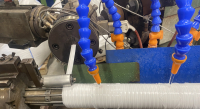The Holistic Approach to Recovery
Mind: Mental and Emotional Health
Addressing Psychological Aspects
The mental and emotional aspects of recovery are pivotal. Women often have distinct psychological and emotional needs that must be addressed for effective healing. This includes therapy for trauma, depression, anxiety, and other mental health issues often intertwined with addiction.
Therapies and Techniques
Counseling, cognitive-behavioral therapy (CBT), and other therapeutic techniques help in addressing these issues. Emotional support through these therapies aids in developing healthier coping mechanisms and emotional resilience.
Body: Physical Wellness
Importance of Physical Health
Physical wellness is another crucial aspect of holistic healing. Substance abuse can take a significant toll on a woman’s body, making it essential to focus on physical health during recovery. One of the most effective ways to support physical wellness is through regular massage sessions. Whether you choose to visit a spa or prefer the convenience of a mobile therapist coming to your home, integrating relaxing, deep tissue, sports, or traditional Thai massages into your routine can be incredibly beneficial. Professional massage therapy helps alleviate stress, reduce muscle tension, improve circulation, and promote overall well-being, all of which are vital for women in recovery.
Nutrition and Exercise
A balanced diet, regular exercise, and adequate rest are fundamental in restoring physical health. Nutritional therapy and fitness programs tailored to individual needs can significantly aid the recovery process.
Spirit: Spiritual and Social Healing
Spiritual Connection
Many women find strength in connecting with a higher power or engaging in spiritual practices. This can include meditation, yoga, or other spiritual or religious activities that provide comfort and guidance.
Building Supportive Communities
Creating a supportive network is also part of spiritual and social healing. Support groups, peer networks, and community involvement offer a sense of belonging and mutual support crucial for long-term recovery.
Integrating Holistic Healing in Recovery Programs
The Role of Rehab Centers
Specialized women’s drug rehab centers often incorporate holistic healing into their programs. These centers understand the unique needs of women in recovery and provide comprehensive care that encompasses mind, body, and spirit.
The Impact of Holistic Healing
Empowering Women in Recovery
Holistic healing empowers women by addressing their specific needs and challenges in recovery. It fosters a sense of control over their healing process and promotes self-awareness and personal growth.
Enhancing Long-term Recovery
By addressing all aspects of a person’s well-being, holistic healing enhances the chances of long-term recovery and sobriety. It provides women with the tools and resources they need to lead a balanced and fulfilling life post-recovery.
Additional Resources
For those seeking more information on holistic approaches to addiction recovery, resources like The National Institute on Drug Abuse (NIDA) provide valuable research and insights. Additionally, The Substance Abuse and Mental Health Services Administration (SAMHSA) offers comprehensive information on substance use disorders and holistic treatment options.
Holistic healing for women in recovery is an approach that integrates the treatment of mind, body, and spirit. This comprehensive approach ensures that all aspects of a woman’s well-being are addressed, leading to a more effective and sustainable recovery. Rehab centers specializing in women’s drug rehab play a crucial role in providing this integrated care. By focusing on holistic healing, women in recovery can achieve not only sobriety but also a balanced and enriched life, paving the way for a brighter, healthier future.






